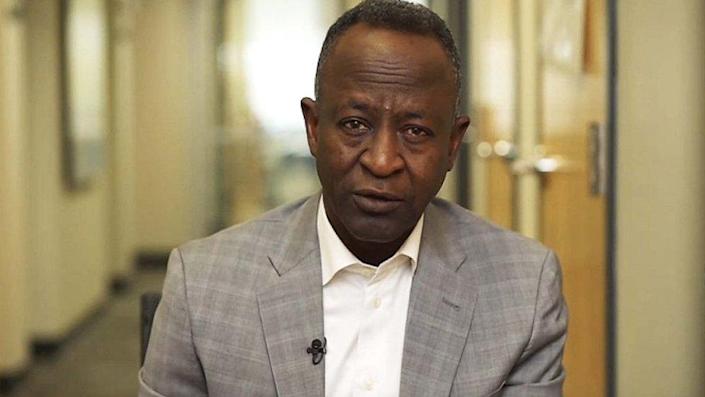
A racist insult broadcast live on Sudanese television during a high-profile trial involving ex-President Omar al-Bashir has triggered an outcry against the racism that continues to permeate Sudanese society three years after the long-time leader was ousted.
Warning: This article contains words which some may find offensive
Bashir’s defence team were chatting among themselves in the courtroom in the capital, Khartoum, and did not realise that their microphones were still on.
One of them was heard to say: “This ‘slave’ with his ugly nose irritates me.”
The Arabic word for slave, “abd”, is often used in Sudan to refer to people whose perceived roots are thought to be African instead of Arab – and is a derogatory term used to describe black people.
The comment, about three hours into the hearing, had nothing to do with the trial being aired on Sudan TV and the YouTube and Facebook pages of the Sudan News Agency (Suna).
The men were discussing renowned journalist Lukman Ahmed, who had just been sacked as director of the state-owned broadcaster.
Ahmed, a former BBC Arabic correspondent who originally comes from Darfur, had been appointed to the role when a civilian coalition and the military were sharing power after Bashir’s ousting.
Last October, the generals reneged on the power-sharing deal, launching a coup. Ahmed stayed on in his post for another six months, but in the end he was accused of failing to honour the military head of state, having relegated news about him to the bottom of the bulletins.
A clip of the lawyer’s comments went viral, with many on social media quick to denounce the racist slur made at Ahmed’s expense.
It brought to mind one of the slogans of the 2019 uprising when revolutionaries chanted: “Oh you arrogant racist, the whole country is Darfur.”


It was aimed at Bashir, who first came to power in 1989 in an Islamist-backed coup and who became infamous around the world for the conflict in Darfur.
He has been charged by the International Criminal Court with committing war crimes and genocide there after pro-government, horse-riding Arab militias, known as Janjaweed, in the early 2000s started targeting villages and driving out their non-Arab residents – or “Zurga”, the local term for ethnic black communities. Bashir refuses to go to The Hague but denies the charges, saying they’re politically motivated.
The fact that it was one of Bashir’s lawyers who made the comment somehow drove home for the revolutionaries that Sudan has taken a step backwards.
Bashir and his contemporaries may still be on trial, but the man who ruled Sudan for nearly 30 years, holding the highest army rank of field marshal, is no longer in jail.
Since the coup he has been in a private military hospital, and many believe the junta will eventually move him home, under house arrest, on humanitarian grounds – continuing the rollback of the revolution that forced him from power.
“This is the outcome of a culture of a corrupt mentality,” the leader of the Sudanese Congress Party (SCP), which had been part of the civilian coalition that was overthrown, tweeted.
As well as Twitter outrage, the Darfur Bar Association has come out in support of Ahmed, launching a case on his behalf against the defence team and the lawyer.
Ahmed told the BBC it was intended “fight racism from spreading in the country”.
To see such blatant racism aimed at a “broad sector of the Sudanese and humanity across the world” in a formal setting “by men of law” was shocking, he said.
To make matters worse, one of the lawyers also used a blasphemous term about Ahmed, saying he cursed his religion – ironically missing the point that the journalist is Muslim too, in what is a majority Muslim country.
Since independence in 1956, racist attitudes have been prevalent in Sudan, both in private and in public – a legacy of the 19th Century slave trade when Ottoman, European and Arab traders launched raids to the south to bring back captives to sell.


It has been a long-held belief that the racist attitudes of Khartoum’s elites has been a driving factor in the country’s turbulent history.
It ultimately pushed the South Sudanese to independence as well as triggering the rebellions against marginalisation in Darfur, the Nuba Mountains and the Blue Nile, which all have large non-Arab populations.
Sudan’s racism is also the focus of a trial at The Hague, where a former Janjaweed leader denies charges of committing crimes against humanity in Darfur.
Ali Muhammad Ali Abd-al-Rahman, also known as Ali Kushayb, is the first person to be tried by the International Criminal Court (ICC) over the conflict that left about 300,000 people dead and more than two million homeless.
Since the October coup, public discourse has again become loaded with racist undertones, hate speech and incitement to violence.
Darfur has again witnessed a resurgence of ethnic clashes and a wave of violent crime has swept the capital and other cities in recent months.
Groups from outside Khartoum from different ethnic backgrounds are being blamed for the street gangsterism, which usually involves armed men on motorbikes, known as “long nines” because of the multiple passengers aboard.
Social media is full of clips of vigilantes beating alleged criminals and lynchings, further fuelling ethnic tension.
The gangs have become associated with rebels from groups in places like the Blue Nile, Darfur and the Nuba Mountains, who felt snubbed by the power-sharing government and have since sided with the military – effectively joining the side they were once fighting.
Those the rebels were purportedly representing see it as an outrage – and it feeds into distrust by Khartoum’s elites of outsiders, leading to pernicious relations between the country’s different regions.
Sudan’s deputy leader, Lt-Gen Mohamed Hamdan “Hemeti” Dagolo, is using all this to his advantage. Seen by the elite as an outsider, from Darfur, he heads the powerful paramilitary Rapid Support Force that has grown out of the Janjaweed.
But his new alliance with his former enemies – the Darfur rebels-cum-mercenaries – has allowed him to further cultivate his power.
Added to this toxic mix is the fact that Sudan has no law criminalising racism – meaning Ahmed is likely to lose his legal battle.
Yet he and his supporters hope the case will shine a light on how racism continues to undermine the country’s social fabric – and so eventually bring some change.
More on Sudan after Bashir:




